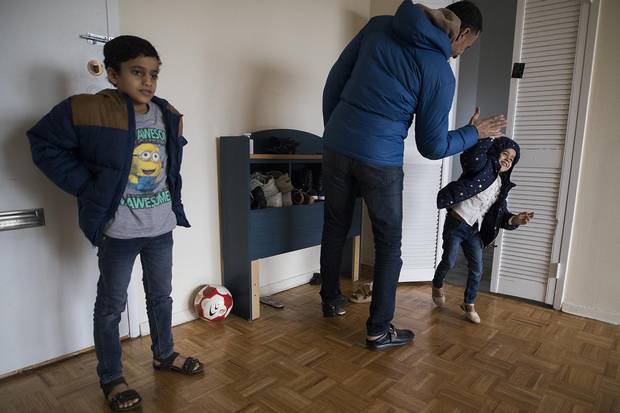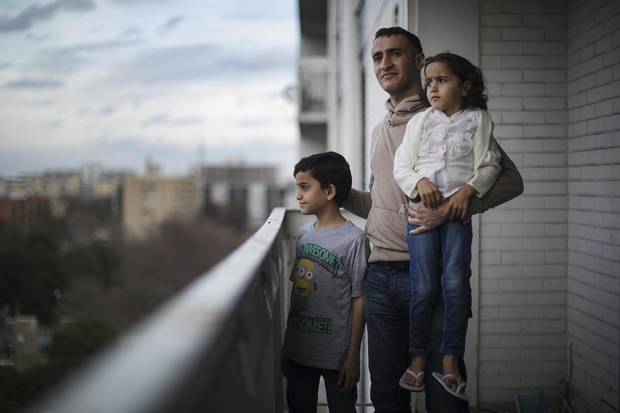When Ali Al-Dhamadi saw the photo, his heart sank.
He sat in his bedroom in Toronto, gripping his phone. On the screen were his children, then aged 3 and 6, playing outside their house in Yemen. They had found a new toy – an unexploded rocket, lying in the gravel just outside their home.
For weeks after receiving the picture, Mr. Al-Dhamadi could not sleep.
He had first come to Canada in 2015, to learn English for his job with Yemen's department of petroleum. Within weeks, the Yemeni civil war broke out. He claimed refugee status and immediately applied for Canadian permanent residency for his family.
Two years later, they were still stuck.
Mr. Al-Dhamadi is one of thousands of Yemeni-Canadians who have watched with terror as their country devolves into a humanitarian disaster. Nearly three years of war have caused tens of thousands to flee the country. Those who stay behind face relentless bombing from Saudi forces and a cholera epidemic preying on people weakened by hunger and the ravages of war.
A three-week-long blockade of Yemen by a Saudi-led coalition fighting the country's Houthi rebels finally eased on the weekend with aid arriving at the Sanaa airport and a 5,500-tonne shipment of flour making its way into the port of Hodeidah. However, the crisis continues to grow, with the charity Save the Children estimating 20,000 Yemeni children under the age of five are joining the list of the severely malnourished every month.
Read more: Yemen's forgotten war, explained
While permanent residency applications for Yemeni families were left unanswered, Canada welcomed more than 40,000 Syrian refugees. In 2016, Canada accepted a total of nearly 47,000 refugees from around the world. That same year, 344 Yemenis filed refugee claims for resettlement in Canada. Only five were accepted.
Yemenis applying for permanent residency in Canada face wait times of more than two years. Given this reality, the Yemeni-Canadian community has a simple question for the Canadian government: "Why the Syrians, but not us?"
Earlier this year, the United Nations declared Yemen's civil war the largest humanitarian crisis in the world. Arghavan Gerami, an immigration and refugee lawyer in Ottawa, has seen Yemeni permanent residency cases in her practice skyrocket since 2015. Now, more than one third of her clients are from Yemen.
"Somebody who is in a country where there is no conflict, maybe they can afford to wait a year," Ms. Gerami said. "But Yemen is not a situation where they can afford to wait."
In this Aug. 25, 2017 file photo, boys stand on the rubble of a house destroyed by Saudi-led air strikes in Sanaa, Yemen.
Hani Mohammed/AP
Refugees cannot directly apply to come to Canada. Instead, they must receive private sponsorship or be identified for resettlement by the UN Refugee Agency.
Unlike the Syrian case, the Canadian government has not started a special refugee program for Yemenis. This leaves them with few alternatives. Yemenis can try to arrive in Canada and claim asylum, or apply for permanent residency, for which there is also no expedited process or risk-based admissions.
Hélène Laverdière, the NDP foreign affairs critic, said the Liberal government has "a moral responsibility" to help Yemenis come to Canada.
However, Faith St-John, a spokeswoman for Immigration, Refugees and Citizenship Canada, told The Globe and Mail by e-mail that the department is "committed to a fair and transparent immigration system that treats all applicants equally, regardless of where they are from."
The Yemeni-Canadian community lobbied the government for an expedited process for their families through letter campaigns, requests on social media and contacts with local MPs. The most recent official response they received was in December, 2015.
After two years of silence from Ottawa, a group of Yemeni-Canadians decided they would have to be the ones to help members of their own community, which the 2016 census lists as more than 6,600 people, an increase of nearly 70 per cent since 2011.
Ali Mohammed applied for permanent residency for his wife and five children in 2015. As he waits for a response, he is helping newly arrived Yemenis find apartments, search for jobs and negotiate a maze of government paperwork.
"We want to make these people a good addition to the Canadian community," he said.
In his few spare moments, Mr. Mohammed volunteers with other Yemenis to help Syrian refugees. They are well acquainted with the isolation of arriving alone in a new country.
He often volunteers with his Yemeni roommate, Abdul Majid Alsalahi. Mr. Alsalahi has received no response about his permanent residency application for his family. His children have not attended school in three years.
"With our loved ones back home, we find it very hard to settle down and be productive," he said.
"Our kids and our families are like parts of our body," Mr. Alsalahi said. "How can you live without them?"
As his friends continue to wait for news, Mr. Al-Dhamadi is one of the lucky members of the Yemeni-Canadian community. After two years of worrying about his family, he was told in August that his wife and children had been granted a visa. They would have less than a month to get to Canada.

Ali Al-Dhamadi gets ready to go outside with his daughter Alya 5, and son Taha, 10, in Toronto on Nov. 21, 2017.
Mark Blinch/The Globe and Mail
Mr. Al-Dhamadi's wife, son and daughter spent nearly two weeks crossing the ruins of Yemen. They arrived in the central city of Seiyun to catch a weekly flight to Jordan, then flew to Saudi Arabia. Four days before their visas were set to expire, they arrived in Canada.
As they drove to their new home, his son, Taha, stared out the window at the skyscrapers lining Toronto's sprawling Highway 401.
"Baba, the buildings here are bad," he told his father.
"Why?" asked Mr. Al-Dhamadi.
"They are all made of glass. When the rockets come, they will break," Taha said.
For a moment, Mr. Al-Dhamadi was silent. Then, he told his son he no longer had to worry about the rockets falling from the sky.
With files from Reuters
The global implications of Yemen's forgotten war
As tales of a global refugee crisis and rising extremism capture international attention, Yemen's conflict has been dubbed the forgotten war.
Glen Rangwala, a professor at Cambridge, says Yemen's civil war has "much wider repercussions … and a real significance to the wider world."
Yemen's conflict has become a proxy war between a Saudi Arabia-led coalition and armed Houthis, who receive limited support from Iran.
The Saudi coalition and the United States have accused Iran of backing the Houthis with funding and military equipment, while Iran has denied the allegations.
The Houthi group promotes the moderate Zaydi branch of Shia Islam, which roughly a third of Yemen's population follows. Since the 1990s, the Houthis have called for a greater role in Yemen's central government and for access to development in their stronghold in the northwestern province of Sa'dah.
In September, 2014, Houthis seized the Yemeni capital, Sanaa. Within weeks, the United Nations brokered a peace deal between the Houthis and other political parties.
That peace was shattered in January, 2015, when Houthi rebels seized the presidential palace. President Abdrabbuh Mansur Hadi resigned, leading the rebels to dissolve parliament and install a transitional government.
The following month, Mr. Hadi denounced the Houthi government as illegitimate and said he was still Yemen's president, leading forces loyal to Mr. Hadi to clash with the Houthis.
By the end of March, Mr. Hadi fled the country and a Saudi Arabia-led coalition began a campaign of air strikes against the Houthis.
The air strikes are continuing, and have frequently targeted civilian areas. Human Rights Watch reports more than 4,000 civilians have been killed – predominantly by coalition air strikes – since the start of the conflict. Militant groups including Islamic State and al-Qaeda are operating in Yemen, adding to the volatility.
"Fundamentalists are one of the major reasons why the Yemen conflict should be a cause for global concern," Dr. Rangwala said.
As infrastructure crumbled, famine and disease took hold of Yemen. The World Health Organization estimates nearly 700,000 Yemenis contracted cholera between April and September, 2017.
Government salaries have not been paid in more than a year and blockades by the Saudi coalition have stopped most imports of food and fuel.
THE MIDDLE EAST: MORE FROM THE GLOBE AND MAIL



